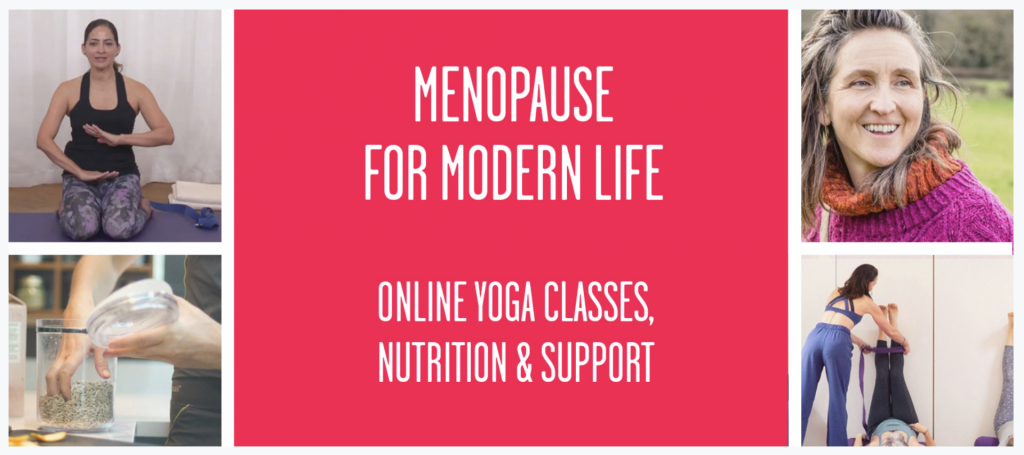
Nutrition is a key component for managing menopause symptoms. In this article Gabriella suggests the best ways to support your journey through menopause with nutritional changes.
Menopause is a time of transition, and what we need nutritionally will quite naturally transition too. Making nutritional changes at this time in our lives will also keep you healthy long after we have come through menopause. Read on for Gabriella’s suggestions for ways to make these changes to your diet and ensure you are supporting yourself nutritionally through menopause.
Read about how Yoga can support you through Menopause in the MFML Yoga for Menopause Complete Guide!
Nutrition for Menopause
As you journey into Menopause your nutritional requirements will change due to the fluctuating nature of your hormones. View this time as an opportunity to nourish your body by adding more goodness to your meals instead of eliminating food groups or dieting. Plan for nutrition to support your energy levels and bone, brain and heart health.
The following tips are guidelines to make informed choices and modifications to your diet. It follows a Mediterranean way of eating which includes lean meats and fish, whole grains, health fats and an abundance of plant foods. Please consult with a Nutritional Therapist for a more bespoke plan to suit your individual requirements or symptoms.
Prioritise Protein
Protein is a major source of energy keeping your blood sugar steady and is key for building and repairing bone, muscle, and skin. Aim for 75-90g of protein a day and a bit more if you’re exercise regularly. Set yourself up for the day by having a protein breakfast – eggs, yogurt, cottage cheese, smoked mackerel. Space out your meals evenly through the day, don’t skip any meals and aim for a protein snack mid morning and/or late afternoon to keep hunger or cravings at bay and to sustain your energy levels. This can be a protein smoothie post workout, a handful of walnuts or almonds with 1 piece of fruit or a small bite of dark chocolate; soft goat’s cheese spread over oat cakes; hummus dip with raw celery, carrot, broccoli or radishes.
In addition to fish, chicken, turkey as animal protein sources you can use plant-based proteins like lentils, beans, chickpeas and nuts/seeds. so that you sustain your energy levels.
Healthy Gut
Happy hormones start in your gut. Chew your food slowly and mindfully to activate enzymes which facilitate digestion and absorption of nutrients. Begin your day with a glass of tepid water with lemon or 1 tsp of Apple Cider Vinegar before breakfast to stimulate your metabolism.
Bitter salads before or with a meal also stimulate your metabolism so include: rocket; watercress; chicory; endive; artichokes; dandelion leaves; romaine lettuce. Make a salad with any of these and add a dressing made of olive oil, lemon, turmeric and apple cider vinegar. Add a combination of prebiotic and probiotic foods to feed and diversify the microflora in your gut. Prebiotic foods include: garlic; onions; leeks; asparagus; bananas and oats. Probiotic foods include: kimchi; sauerkraut; kefir; yogurt or kombucha.
Unrefined Carbohydrates and low GL (Glycaemic Load) foods
Low GL foods release sugar more slowly into the blood, thereby keeping blood sugar levels more stable. This helps to avoid excess insulin in your system which can disrupt your other hormones and cause symptoms such as fatigue, brain fog, disrupted sleep. Consume unrefined and whole grains (quinoa, brown rice, oats, rye, spelt) for more sustained energy throughout the day. Cut back on sweet snacks or drinks and added sugar as much as possible. Sprinkling a teaspoon of cinnamon to porridge or smoothies in the morning or drinking cinnamon tea can reduce your sugar cravings and balance blood sugar levels. Keep your fruit intake to 2-3 portions a day and try the less sugary variety such as berries, apples, pears, kiwi.
Read about the BEST foods for Menopause!
Choose Healthy Fats
Omega 3 Essential Fatty Acids are essential for the production, storage and transport of your hormones as well as reducing inflammation and promoting skin and brain health. Increase intake of oily fish such as sardines, mackerel, anchovies, salmon and herring to 3 times per week. Other sources of Omega 3 include: chia seeds, flax seeds, hemp seeds, pumpkin seeds, walnuts, avocados, organic dairy, coconut oil and olive oil.
Eat your Veggies
Think the colours of the rainbow and aim to fill half your plate with colourful vegetables and rotate often. Incorporate cruciferous vegetables such as: kale; cabbage; cavolo nero; broccoli; brussel sprouts; cauliflower and pak choi. These contain fibre for gastro intestinal motility help your body metabolise and eliminate excess oestrogen from the body, which can contribute to bloating. Cook lightly steamed and drizzle olive oil, lemon, salt and pepper. You can also roast sweet potatoes, carrots, parsnips, squash, bell peppers.
Calcium Intake
Sufficient calcium intake is essential to maintain bone density to prevent osteoporosis. The recommended intake of calcium for menopausal women (age 40 plus) is 1000mg/day and ideally taken through food. Consume calcium rich foods – milk, yogurt, cheese as well as non- dairy sources such as almonds, sesame seeds also in the form of tahini, tofu, tinned salmon or sardines with small bones, dark leafy greens i.e. spinach, pak choi, kale, broccoli. Fortified plant based milks i.e. Oat Milk, Almond Milk with low sugar.
Support your Liver
A sluggish liver can affect the natural detoxification of toxins and hormones – especially oestrogen. If oestrogen is not properly eliminated it can accumulate and cause hormonal acne, bloating, headaches, mood swings and PMS. Support your liver & digestion by eating cruciferous vegetables like broccoli, cauliflower, brussel sprouts, kale, drink plenty of filtered water, switch to natural household and personal care products, avoid plastic, reduce alcohol and choose organic foods.
Add Phytoestrogens
Phytoestrogens are natural plant compounds that are structurally similar to our oestrogen hormone. These can mimic the action of oestrogen in the body. This could be helpful in menopause as by consuming them you can make up for some of your declining oestrogen levels and reduce some of the symptoms you experience. The most significant type of phytoestrogens for menopause symptoms are isoflavones, most commonly found in soy products, but you can also find them in flaxseeds, chickpeas, sesame seeds, pumpkin seeds, mung beans.
Caffeine Intake
Caffeine is good for some women and not so great for others as it stimulates cortisol, our stress hormone. If you are stressed or have abnormal cortisol levels and feel like you NEED that cup of coffee to get going then it could be a sign of an imbalance. Try to limit caffeine to the morning and turn to alternatives in the afternoon such as herbal teas, adaptogenic drinks, chicory or golden milk.
Stay Hydrated
Every cell needs water, and hormones need it to be transported around the body. Water helps with digestion and detoxification. Drink 2 liters of filtered water per day. Carry a glass or BPA free bottle with you everywhere!

This yoga for menopause course brings together specialist contributors and offers yoga classes, audio interviews, facts, guidance and community. The course is suitable for anyone interested in understanding more about menopause, women going through perimenopause and menopause.

Gabriella Espinosa is a menopause and sexual wellness coach, yoga/somatic movement teacher and the founder of Women’s Body Wisdom. Her work is informed by over 15 years of guiding women to know, trust and appreciate their bodies. Her classes are designed to address the common symptoms experienced in menopause, but most importantly they are an exploration of each woman’s unique journey to self-discovery.
Gabriella leads 1-1 and group coaching programs online and facilitates women’s wellness retreats internationally. She contributes her writing on women’s health and yoga to publications in the US and UK. Find Gabriella’s Menopause classes on MFML out find out more http://www.gabriellaespinosa.com





Leave a Reply